The Use of African American Vernacular English in


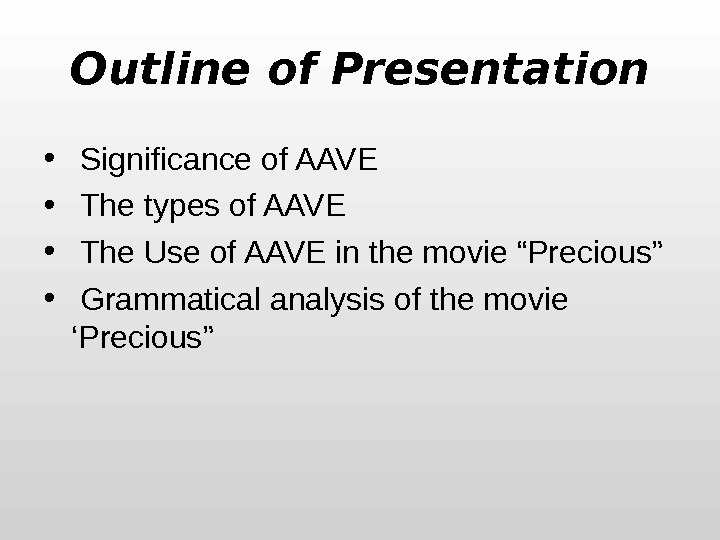


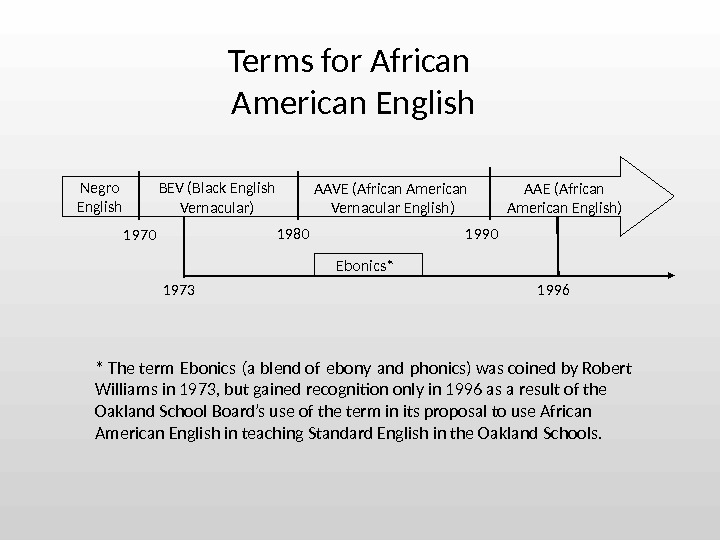

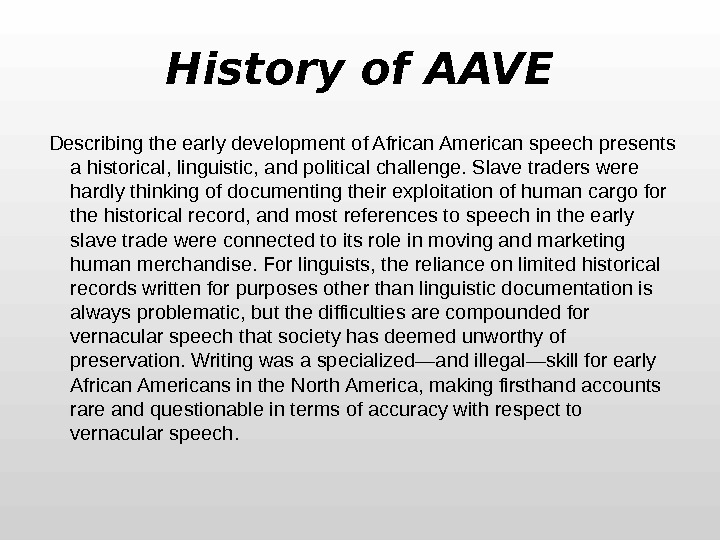

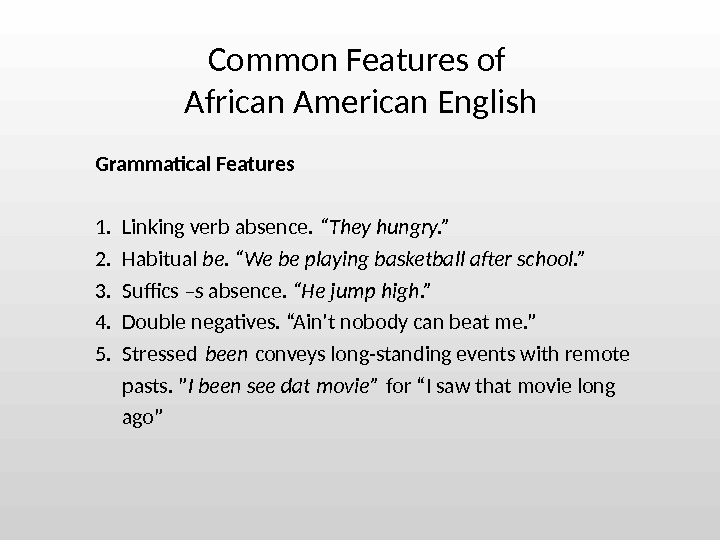
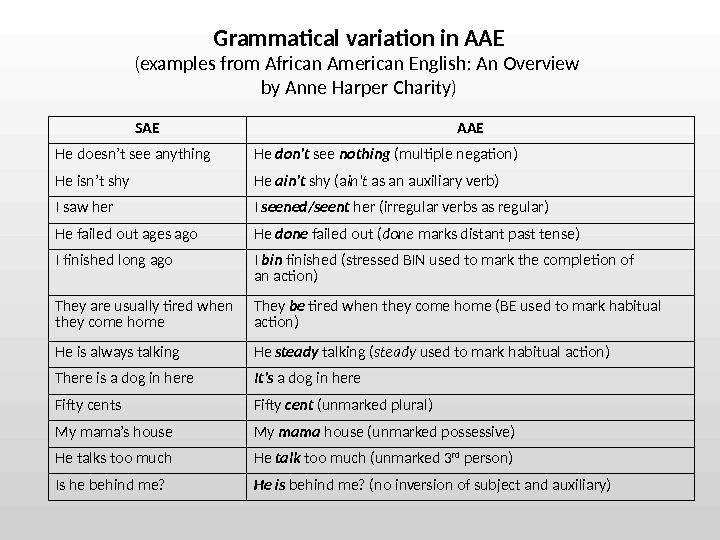

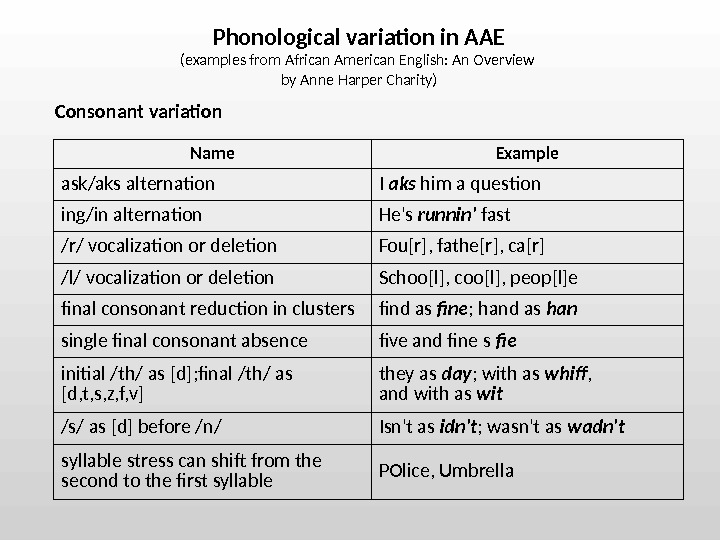
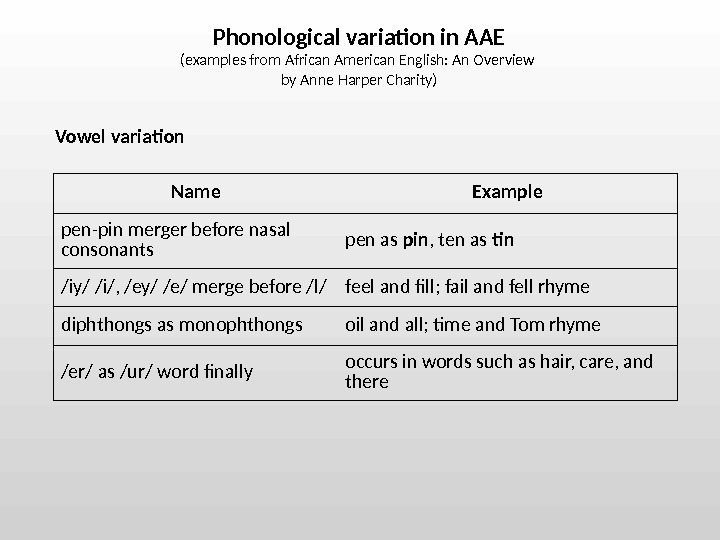
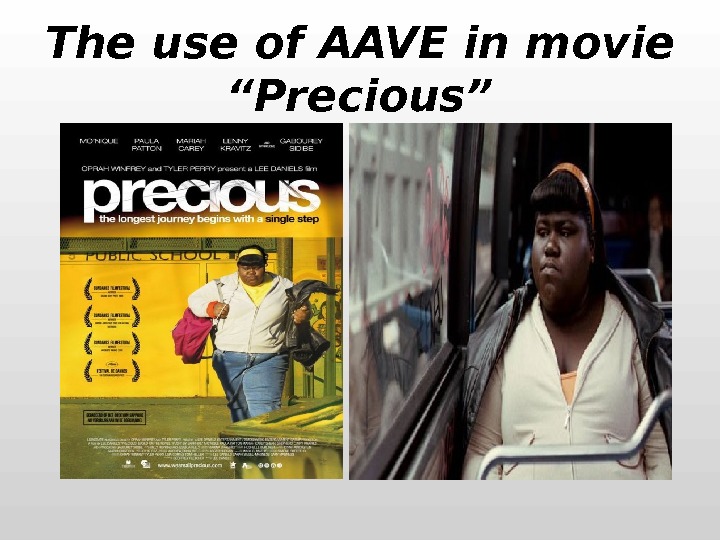

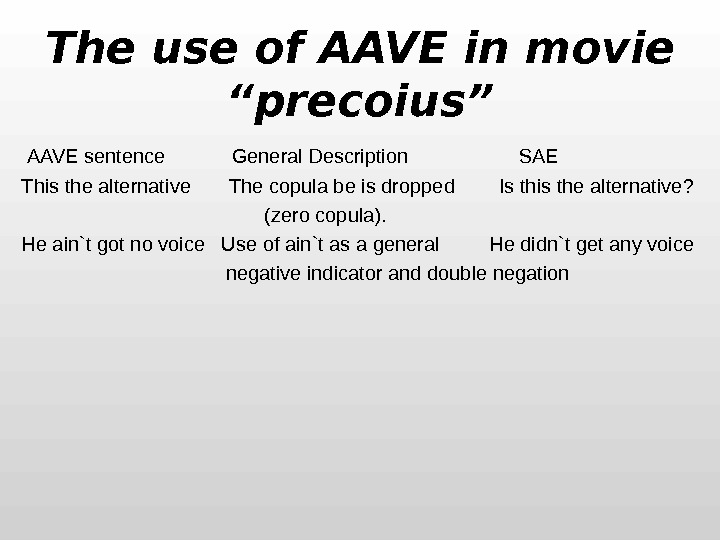
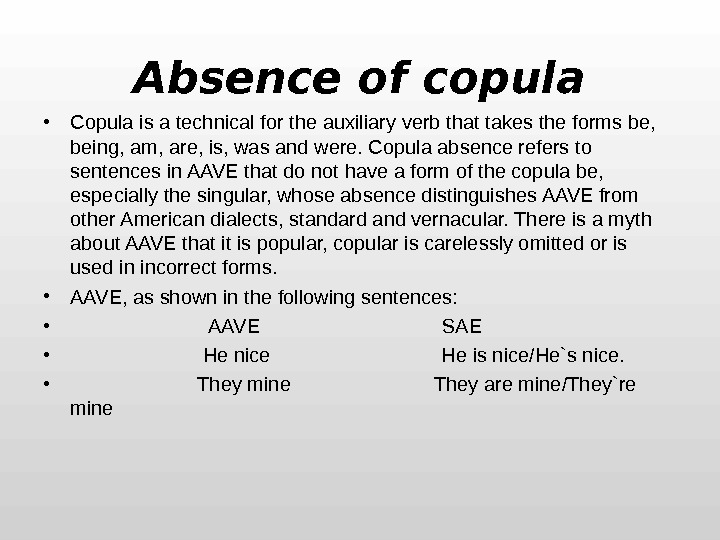
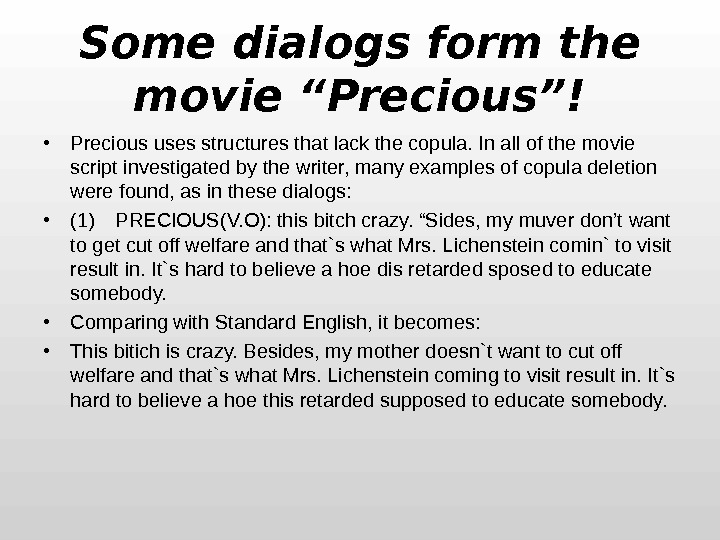
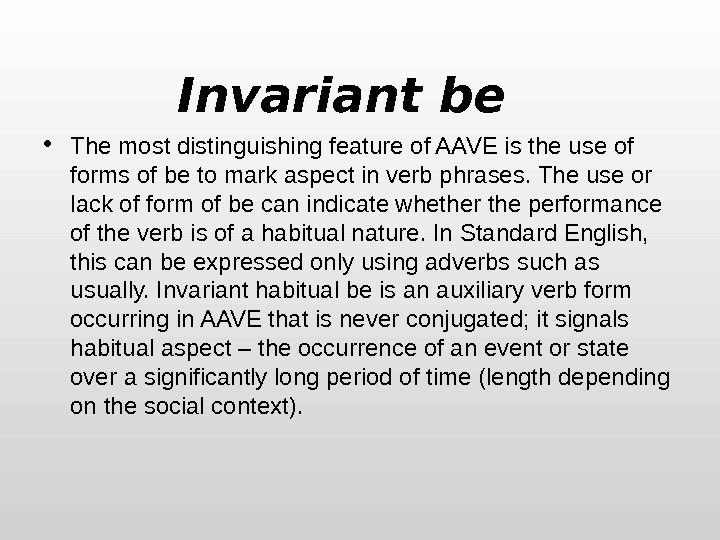
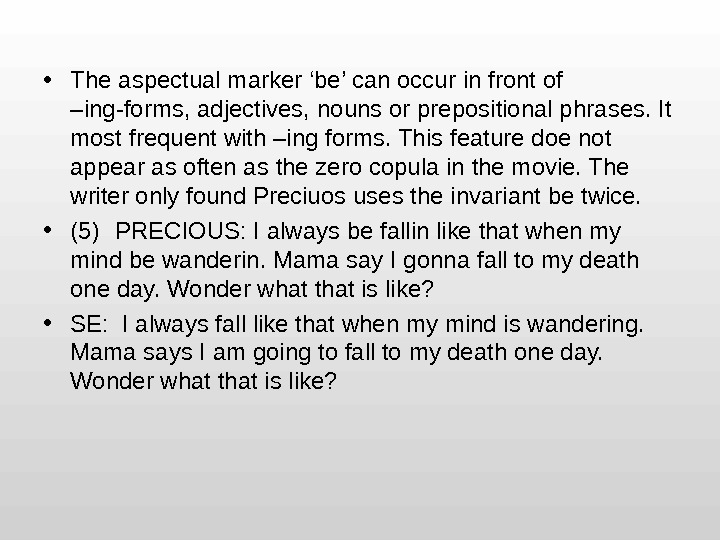


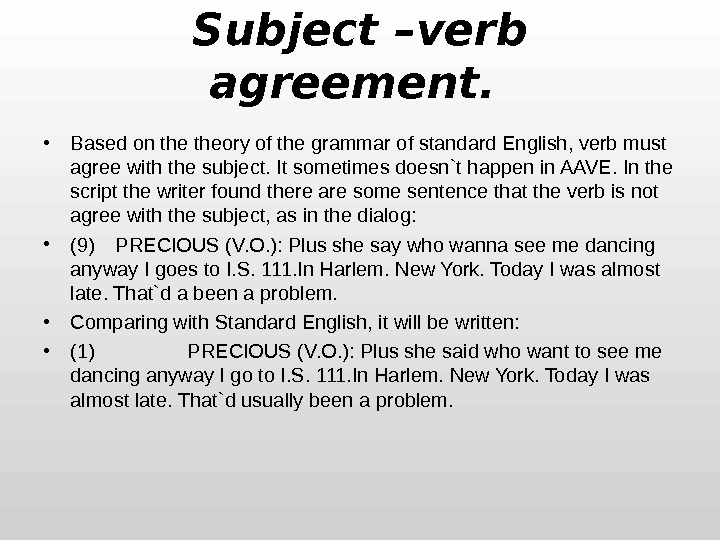
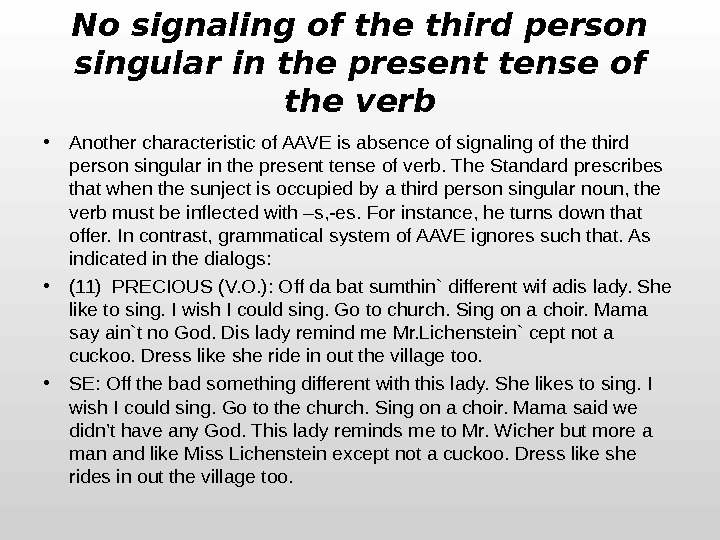
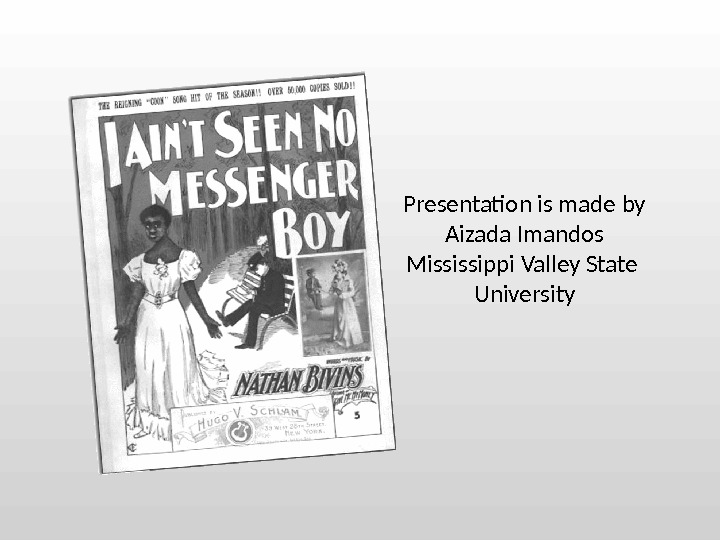
african_american_english_-_yamanova.ppt
- Размер: 1.7 Mегабайта
- Количество слайдов: 26
Описание презентации The Use of African American Vernacular English in по слайдам
 The Use of African American Vernacular English in the US movies
The Use of African American Vernacular English in the US movies
 Introduction AAVE used in T. V. usually shows the speaker of AAVE in a humorous, mocking way that degrades AAVE and makes the speaker look uneducated. They Are usually not taken seriously by the other characters.
Introduction AAVE used in T. V. usually shows the speaker of AAVE in a humorous, mocking way that degrades AAVE and makes the speaker look uneducated. They Are usually not taken seriously by the other characters.
 Outline of Presentation • Significance of AAVE • The types of AAVE • The Use of AAVE in the movie “Precious” • Grammatical analysis of the movie ‘Precious”
Outline of Presentation • Significance of AAVE • The types of AAVE • The Use of AAVE in the movie “Precious” • Grammatical analysis of the movie ‘Precious”
 English Dialects of the U. S American English (Am. E, Am. Eng, USEng) Cultural • African-American Vernacular English (AAVE) • Chicano English • General American • New York Latino English • Pennsylvania Dutchified English • Yeshivish • Yinglish
English Dialects of the U. S American English (Am. E, Am. Eng, USEng) Cultural • African-American Vernacular English (AAVE) • Chicano English • General American • New York Latino English • Pennsylvania Dutchified English • Yeshivish • Yinglish
 What Is African American English ? African American English (AAE) is a dialect * of American English used by many African Americans. Like other dialects of English, AAE is a regular, systematic language variety that contrasts with other dialects in terms of its grammar, pronunciation and vocabulary. *T here is still a debate on the status of AAE as a distinct dialect of American English spoken by many African Americans or as a language in its own right. ( See Rethinking Schools, “The Real Ebonics Debate»)
What Is African American English ? African American English (AAE) is a dialect * of American English used by many African Americans. Like other dialects of English, AAE is a regular, systematic language variety that contrasts with other dialects in terms of its grammar, pronunciation and vocabulary. *T here is still a debate on the status of AAE as a distinct dialect of American English spoken by many African Americans or as a language in its own right. ( See Rethinking Schools, “The Real Ebonics Debate»)
 1980 1996 Terms for African American English 1970 Negro English BEV ( Black English Vernacular ) AAVE ( African American Vernacular English ) 1990 AAE ( African American English ) 1973 Ebonics* * The term Ebonics (a blend of ebony and phonics) was coined by Robert Williams in 1973 , but gained recognition only in 1996 as a result of the Oakland School Board’s use of the term in its proposal to use African American English in teaching Standard English in the Oakland Schools.
1980 1996 Terms for African American English 1970 Negro English BEV ( Black English Vernacular ) AAVE ( African American Vernacular English ) 1990 AAE ( African American English ) 1973 Ebonics* * The term Ebonics (a blend of ebony and phonics) was coined by Robert Williams in 1973 , but gained recognition only in 1996 as a result of the Oakland School Board’s use of the term in its proposal to use African American English in teaching Standard English in the Oakland Schools.
 Who speaks African American Vernacular English? Many African Americans are able to speak AAVE. However, the estimated percentage of the African Americans in the US who speak AAVE ranges from 80 — 90%. Young speakers of AAVE often have more characteristics of AAVE in their speech than older speakers do.
Who speaks African American Vernacular English? Many African Americans are able to speak AAVE. However, the estimated percentage of the African Americans in the US who speak AAVE ranges from 80 — 90%. Young speakers of AAVE often have more characteristics of AAVE in their speech than older speakers do.
 History of AAVE Describing the early development of African American speech presents a historical, linguistic, and political challenge. Slave traders were hardly thinking of documenting their exploitation of human cargo for the historical record, and most references to speech in the early slave trade were connected to its role in moving and marketing human merchandise. For linguists, the reliance on limited historical records written for purposes other than linguistic documentation is always problematic, but the difficulties are compounded for vernacular speech that society has deemed unworthy of preservation. Writing was a specialized—and illegal—skill for early African Americans in the North America, making firsthand accounts rare and questionable in terms of accuracy with respect to vernacular speech.
History of AAVE Describing the early development of African American speech presents a historical, linguistic, and political challenge. Slave traders were hardly thinking of documenting their exploitation of human cargo for the historical record, and most references to speech in the early slave trade were connected to its role in moving and marketing human merchandise. For linguists, the reliance on limited historical records written for purposes other than linguistic documentation is always problematic, but the difficulties are compounded for vernacular speech that society has deemed unworthy of preservation. Writing was a specialized—and illegal—skill for early African Americans in the North America, making firsthand accounts rare and questionable in terms of accuracy with respect to vernacular speech.
 2 main theories about the origins of AAE: 1. A pidgin developed by slaves transported from Africa to America became full-fledged creole language 2. African American slaves learned English from indentured servants, who spoke non-mainstream varieties of English. Origins of African American English
2 main theories about the origins of AAE: 1. A pidgin developed by slaves transported from Africa to America became full-fledged creole language 2. African American slaves learned English from indentured servants, who spoke non-mainstream varieties of English. Origins of African American English
 Grammatical Features 1. Linking verb absence. “They hungry. ” 2. Habitual be. “We be playing basketball after school. ” 3. Suffics –s absence. “He jump high. ” 4. Double negatives. “Ain’t nobody can beat me. ” 5. Stressed been conveys long-standing events with remote pasts. ” I been see dat movie ” for “ I saw that movie long ago ” Common Features of African American English
Grammatical Features 1. Linking verb absence. “They hungry. ” 2. Habitual be. “We be playing basketball after school. ” 3. Suffics –s absence. “He jump high. ” 4. Double negatives. “Ain’t nobody can beat me. ” 5. Stressed been conveys long-standing events with remote pasts. ” I been see dat movie ” for “ I saw that movie long ago ” Common Features of African American English
 Grammatical variation in AAE (examples from African American English: An Overview by Anne Harper Charity ) SAE AAE He doesn’t see anything He don’t see nothing (multiple negation) He isn’t shy He ain’t shy (a in’t as an auxiliary verb) I saw her I seened/seent her (irregular verbs as regular) He failed out ages ago He done failed out ( done marks distant past tense) I finished long ago I bin finished (stressed BIN used to mark the completion of an action) They are usually tired when they come home They be tired when they come home (BE used to mark habitual action) He is always talking He steady talking ( steady used to mark habitual action) There is a dog in here It’s a dog in here Fifty cents Fifty cent (unmarked plural) My mama’s house My mama house (unmarked possessive) He talks too much He talk too much (unmarked 3 rd person) Is he behind me? He is behind me? (no inversion of subject and auxiliary)
Grammatical variation in AAE (examples from African American English: An Overview by Anne Harper Charity ) SAE AAE He doesn’t see anything He don’t see nothing (multiple negation) He isn’t shy He ain’t shy (a in’t as an auxiliary verb) I saw her I seened/seent her (irregular verbs as regular) He failed out ages ago He done failed out ( done marks distant past tense) I finished long ago I bin finished (stressed BIN used to mark the completion of an action) They are usually tired when they come home They be tired when they come home (BE used to mark habitual action) He is always talking He steady talking ( steady used to mark habitual action) There is a dog in here It’s a dog in here Fifty cents Fifty cent (unmarked plural) My mama’s house My mama house (unmarked possessive) He talks too much He talk too much (unmarked 3 rd person) Is he behind me? He is behind me? (no inversion of subject and auxiliary)
 Pronunciation Features 1. Varying pronunciations of ‘th’ (‘ dese ’, ‘ wit ’ and ‘ birfday ’ for these, with, birthday) 2. “ g -dropping” as in fishin ’ and fightin ’. 3. Consonant cluster reduction ( ‘ des ’ for desk , ‘ col ’ for cold ) 4. Phonological inversion (‘ ax ’ for ‘ask’) 5. Past-tense endings absen ce ( ‘ look ’ for looked , ‘ talk ’ for talked ). Common Features of African A merican English
Pronunciation Features 1. Varying pronunciations of ‘th’ (‘ dese ’, ‘ wit ’ and ‘ birfday ’ for these, with, birthday) 2. “ g -dropping” as in fishin ’ and fightin ’. 3. Consonant cluster reduction ( ‘ des ’ for desk , ‘ col ’ for cold ) 4. Phonological inversion (‘ ax ’ for ‘ask’) 5. Past-tense endings absen ce ( ‘ look ’ for looked , ‘ talk ’ for talked ). Common Features of African A merican English
 Phonological variation in AAE (examples from African American English: An Overview by Anne Harper Charity ) Name Example ask/aks alternation I aks him a question ing/in alternation He’s runnin’ fast /r/ vocalization or deletion Fou [ r ] , fathe [ r ] , ca [ r ] /l/ vocalization or deletion Schoo [ l ] , coo [ l ] , peop [ l ] e final consonant reduction in clusters find as fine ; hand as han single final consonant absence five and fine s fie initial /th/ as [d]; final /th/ as [d, t, s, z, f, v] they as day ; with as whif , and with as wit /s/ as [d] before /n/ Isn’t as idn’t ; wasn’t as wadn’t s yllable stress can shift from the second to the first syllable POlice, Umbrella. Consonant variation
Phonological variation in AAE (examples from African American English: An Overview by Anne Harper Charity ) Name Example ask/aks alternation I aks him a question ing/in alternation He’s runnin’ fast /r/ vocalization or deletion Fou [ r ] , fathe [ r ] , ca [ r ] /l/ vocalization or deletion Schoo [ l ] , coo [ l ] , peop [ l ] e final consonant reduction in clusters find as fine ; hand as han single final consonant absence five and fine s fie initial /th/ as [d]; final /th/ as [d, t, s, z, f, v] they as day ; with as whif , and with as wit /s/ as [d] before /n/ Isn’t as idn’t ; wasn’t as wadn’t s yllable stress can shift from the second to the first syllable POlice, Umbrella. Consonant variation
 Phonological variation in AAE (examples from African American English: An Overview by Anne Harper Charity ) Vowel variation Name Example pen-pin merger before nasal consonants pen as pin , ten as tin /iy/ /i/, /ey/ /e/ merge before /l/ feel and fill; fail and fell rhyme diphthongs as monophthongs oil and all; time and Tom rhyme /er/ as /ur/ word finally occurs in words such as hair, care, and there
Phonological variation in AAE (examples from African American English: An Overview by Anne Harper Charity ) Vowel variation Name Example pen-pin merger before nasal consonants pen as pin , ten as tin /iy/ /i/, /ey/ /e/ merge before /l/ feel and fill; fail and fell rhyme diphthongs as monophthongs oil and all; time and Tom rhyme /er/ as /ur/ word finally occurs in words such as hair, care, and there
 The use of AAVE in movie “Precious”
The use of AAVE in movie “Precious”
 The use of AAVE in the book “push” which Precious movie based on!
The use of AAVE in the book “push” which Precious movie based on!
 The use of AAVE in movie “precoius” AAVE sentence General Description SAE This the alternative The copula be is dropped Is this the alternative? (zero copula). He ain`t got no voice Use of ain`t as a general He didn`t get any voice negative indicator and double negation
The use of AAVE in movie “precoius” AAVE sentence General Description SAE This the alternative The copula be is dropped Is this the alternative? (zero copula). He ain`t got no voice Use of ain`t as a general He didn`t get any voice negative indicator and double negation
 Absence of copula • Copula is a technical for the auxiliary verb that takes the forms be, being, am, are, is, was and were. Copula absence refers to sentences in AAVE that do not have a form of the copula be, especially the singular, whose absence distinguishes AAVE from other American dialects, standard and vernacular. There is a myth about AAVE that it is popular, copular is carelessly omitted or is used in incorrect forms. • AAVE, as shown in the following sentences: • AAVE SAE • He nice He is nice/He`s nice. • They mine They are mine/They`re mine
Absence of copula • Copula is a technical for the auxiliary verb that takes the forms be, being, am, are, is, was and were. Copula absence refers to sentences in AAVE that do not have a form of the copula be, especially the singular, whose absence distinguishes AAVE from other American dialects, standard and vernacular. There is a myth about AAVE that it is popular, copular is carelessly omitted or is used in incorrect forms. • AAVE, as shown in the following sentences: • AAVE SAE • He nice He is nice/He`s nice. • They mine They are mine/They`re mine
 Some dialogs form the movie “Precious”! • Precious uses structures that lack the copula. In all of the movie script investigated by the writer, many examples of copula deletion were found, as in these dialogs: • (1) PRECIOUS(V. O): this bitch crazy. “Sides, my muver don’t want to get cut off welfare and that`s what Mrs. Lichenstein comin` to visit result in. It`s hard to believe a hoe dis retarded sposed to educate somebody. • Comparing with Standard English, it becomes: • This bitich is crazy. Besides, my mother doesn`t want to cut off welfare and that`s what Mrs. Lichenstein coming to visit result in. It`s hard to believe a hoe this retarded supposed to educate somebody.
Some dialogs form the movie “Precious”! • Precious uses structures that lack the copula. In all of the movie script investigated by the writer, many examples of copula deletion were found, as in these dialogs: • (1) PRECIOUS(V. O): this bitch crazy. “Sides, my muver don’t want to get cut off welfare and that`s what Mrs. Lichenstein comin` to visit result in. It`s hard to believe a hoe dis retarded sposed to educate somebody. • Comparing with Standard English, it becomes: • This bitich is crazy. Besides, my mother doesn`t want to cut off welfare and that`s what Mrs. Lichenstein coming to visit result in. It`s hard to believe a hoe this retarded supposed to educate somebody.
 Invariant be • The most distinguishing feature of AAVE is the use of forms of be to mark aspect in verb phrases. The use or lack of form of be can indicate whether the performance of the verb is of a habitual nature. In Standard English, this can be expressed only using adverbs such as usually. Invariant habitual be is an auxiliary verb form occurring in AAVE that is never conjugated; it signals habitual aspect – the occurrence of an event or state over a significantly long period of time (length depending on the social context).
Invariant be • The most distinguishing feature of AAVE is the use of forms of be to mark aspect in verb phrases. The use or lack of form of be can indicate whether the performance of the verb is of a habitual nature. In Standard English, this can be expressed only using adverbs such as usually. Invariant habitual be is an auxiliary verb form occurring in AAVE that is never conjugated; it signals habitual aspect – the occurrence of an event or state over a significantly long period of time (length depending on the social context).
 • The aspectual marker ‘be’ can occur in front of –ing-forms, adjectives, nouns or prepositional phrases. It most frequent with –ing forms. This feature doe not appear as often as the zero copula in the movie. The writer only found Preciuos uses the invariant be twice. • (5) PRECIOUS: I always be fallin like that when my mind be wanderin. Mama say I gonna fall to my death one day. Wonder what that is like? • SE: I always fall like that when my mind is wandering. Mama says I am going to fall to my death one day. Wonder what that is like?
• The aspectual marker ‘be’ can occur in front of –ing-forms, adjectives, nouns or prepositional phrases. It most frequent with –ing forms. This feature doe not appear as often as the zero copula in the movie. The writer only found Preciuos uses the invariant be twice. • (5) PRECIOUS: I always be fallin like that when my mind be wanderin. Mama say I gonna fall to my death one day. Wonder what that is like? • SE: I always fall like that when my mind is wandering. Mama says I am going to fall to my death one day. Wonder what that is like?
 Regular and Irregular past verbs • In AAVE, regular is not obligatory. It frequently omitted. Green, as quote by Oetting and Pruitt, states that internal markers of tense are often required in AAE. However, for irregular past tense, Green states that internal markers of tense are often required in AAE. However, over- regularized forms (e. g. , falled) and forms a typical of Standard American English (e. g, drunk, brung, had fell, had walked) may be produced within these contexts.
Regular and Irregular past verbs • In AAVE, regular is not obligatory. It frequently omitted. Green, as quote by Oetting and Pruitt, states that internal markers of tense are often required in AAE. However, for irregular past tense, Green states that internal markers of tense are often required in AAE. However, over- regularized forms (e. g. , falled) and forms a typical of Standard American English (e. g, drunk, brung, had fell, had walked) may be produced within these contexts.
 As observe in the dialogs: • (7) PRECIOUS: …Sometimes I see vampires too. They come fro me sometimes and they say that I am one of them. They say”Precious, you belong wif us” (SE: Precious, you belong with us”) • MS. WEISS: How do you respond to them? • PRECIOUS: I say, “Check wif my muver”. After that, they just look at me and go down through the floor. The family downstairs is vampires so that`s where they should go. (SE: “Check with my mother”) • Grammatically in Standard English becomes: •
As observe in the dialogs: • (7) PRECIOUS: …Sometimes I see vampires too. They come fro me sometimes and they say that I am one of them. They say”Precious, you belong wif us” (SE: Precious, you belong with us”) • MS. WEISS: How do you respond to them? • PRECIOUS: I say, “Check wif my muver”. After that, they just look at me and go down through the floor. The family downstairs is vampires so that`s where they should go. (SE: “Check with my mother”) • Grammatically in Standard English becomes: •
 Subject –verb agreement. • Based on theory of the grammar of standard English, verb must agree with the subject. It sometimes doesn`t happen in AAVE. In the script the writer found there are some sentence that the verb is not agree with the subject, as in the dialog: • (9) PRECIOUS (V. O. ): Plus she say who wanna see me dancing anyway I goes to I. S. 111. In Harlem. New York. Today I was almost late. That`d a been a problem. • Comparing with Standard English, it will be written: • (1) PRECIOUS (V. O. ): Plus she said who want to see me dancing anyway I go to I. S. 111. In Harlem. New York. Today I was almost late. That`d usually been a problem.
Subject –verb agreement. • Based on theory of the grammar of standard English, verb must agree with the subject. It sometimes doesn`t happen in AAVE. In the script the writer found there are some sentence that the verb is not agree with the subject, as in the dialog: • (9) PRECIOUS (V. O. ): Plus she say who wanna see me dancing anyway I goes to I. S. 111. In Harlem. New York. Today I was almost late. That`d a been a problem. • Comparing with Standard English, it will be written: • (1) PRECIOUS (V. O. ): Plus she said who want to see me dancing anyway I go to I. S. 111. In Harlem. New York. Today I was almost late. That`d usually been a problem.
 No signaling of the third person singular in the present tense of the verb • Another characteristic of AAVE is absence of signaling of the third person singular in the present tense of verb. The Standard prescribes that when the sunject is occupied by a third person singular noun, the verb must be inflected with –s, -es. For instance, he turns down that offer. In contrast, grammatical system of AAVE ignores such that. As indicated in the dialogs: • (11) PRECIOUS (V. O. ): Off da bat sumthin` different wif adis lady. She like to sing. I wish I could sing. Go to church. Sing on a choir. Mama say ain`t no God. Dis lady remind me Mr. Lichenstein` cept not a cuckoo. Dress like she ride in out the village too. • SE: Off the bad something different with this lady. She likes to sing. I wish I could sing. Go to the church. Sing on a choir. Mama said we didn’t have any God. This lady reminds me to Mr. Wicher but more a man and like Miss Lichenstein except not a cuckoo. Dress like she rides in out the village too.
No signaling of the third person singular in the present tense of the verb • Another characteristic of AAVE is absence of signaling of the third person singular in the present tense of verb. The Standard prescribes that when the sunject is occupied by a third person singular noun, the verb must be inflected with –s, -es. For instance, he turns down that offer. In contrast, grammatical system of AAVE ignores such that. As indicated in the dialogs: • (11) PRECIOUS (V. O. ): Off da bat sumthin` different wif adis lady. She like to sing. I wish I could sing. Go to church. Sing on a choir. Mama say ain`t no God. Dis lady remind me Mr. Lichenstein` cept not a cuckoo. Dress like she ride in out the village too. • SE: Off the bad something different with this lady. She likes to sing. I wish I could sing. Go to the church. Sing on a choir. Mama said we didn’t have any God. This lady reminds me to Mr. Wicher but more a man and like Miss Lichenstein except not a cuckoo. Dress like she rides in out the village too.
 Presentation is made by Aizada Imandos Mississippi Valley State University
Presentation is made by Aizada Imandos Mississippi Valley State University
